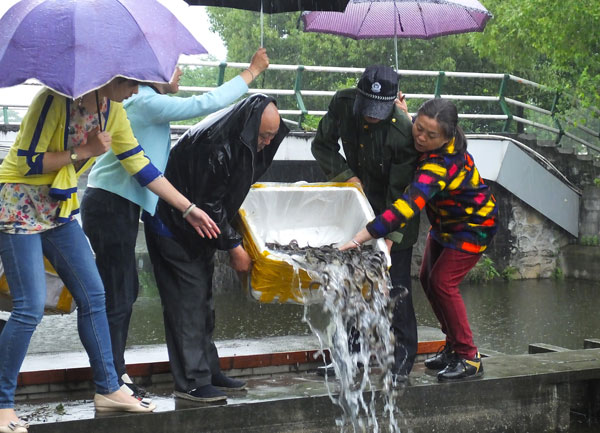'Compassion' overload poses ecosystem threat
Updated: 2016-07-11 08:48
By Su Zhou(China Daily)
|
|||||||||
 |
|
People release more than 50 kg of loaches into a river in Yichang, Hubei province, to celebrate the Buddha's birthday on May 14. [Photo by Liu Junfeng/China Daily] |
By April 15, only 40 of the animals were still alive, the rest having starved to death or been fatally injured in fights.
According to the revised Law on the Protection of Wildlife, adopted on July 2 by the Standing Committee of the National People's Congress, it is illegal to release animals into the wild without authorization.
"People and organizations should select species that can adapt to the places where they plan to set them free, to avoid disturbing local residents' property and livelihoods, and to prevent damage to the local ecological system," the law says. "Those who harm local ecology and bring personal or property damages on others through the unauthorized release of wildlife will face legal liabilities."
Xie Yan, an associate research professor at the Chinese Academy of Sciences' Institute of Zoology, said releasing animals without scientific guidance could have a negative impact on the ecosystem.
"The eco-balance is formed naturally over years, by its own development. The sudden intrusion of a large number of outside species could seriously damage the eco-balance," she said.
"If the animals being released have no natural enemies in the new habitat, their numbers could swell rapidly and threaten other species. Moreover, some of these animals have been raised in cages and they carry viruses. If other local species are infected by viruses for which they have no antibodies, they are likely to die," she added.
Xie believes an illegal industry is fueling the rise in the number of cases, resulting in vendors making fat profits from exploiting people's goodwill.
Yan Xun, chief engineer at the Department of Wildlife Conservation and Nature Reserve Management at the State Forestry Administration, said related underground industries exist in many areas.
"Many religious people and animal rights activists believe they are performing a noble act, and to demonstrate their faith they refuse to haggle with the traders," he said.
Kong Lingshui, who leads a law enforcement team with the Beijing forestry authorities, said he monitored a market where animals were sold in the Changping district, and saw about 500 people pay 530 yuan ($71) each to buy animals to release into the wild.
The vendors made about 265,000 yuan in total, a huge profit, given the animals' real market value.
"The total cost (of the animals) was no more than 20,000 yuan, and many of them were unable to survive in the wild," Kong said. "Some vendors even recapture the animals and sell them again, resulting in a death rate of about 30 percent. This trade has to be stopped."
Today's Top News
Suspect in Dallas attack wanted to 'kill white people'
5 Dallas police killed at protest against police shooting
Ministry slams US-Korean THAAD deployment
Shoring up support
UK Iraq report highly critical of Tony Blair
UK invasion of Iraq was not last resort: Report
Berlusconi accepts Chinese offer for AC Milan
UK consultancy loses license, Chinese graduates being told to leave
Hot Topics
Lunar probe , China growth forecasts, Emission rules get tougher, China seen through 'colored lens', International board,
Editor's Picks

|

|

|

|

|

|







